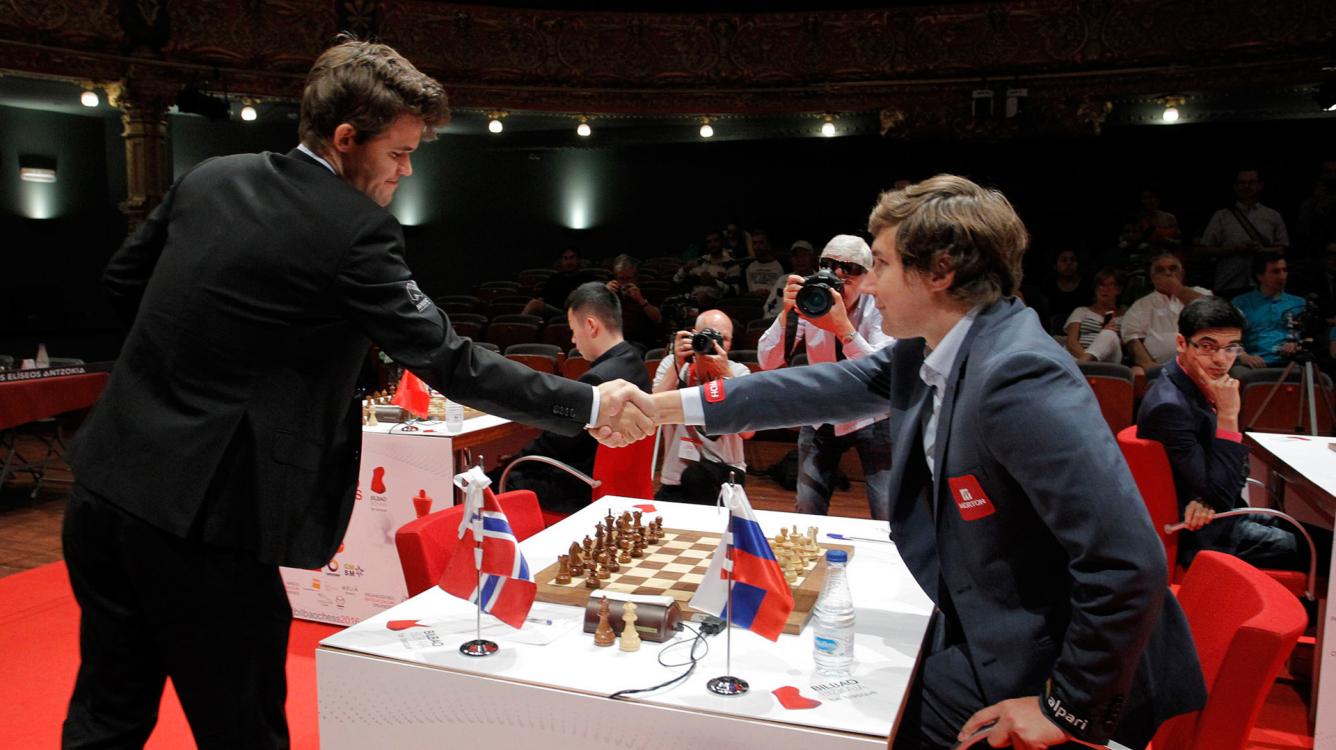
Carlsen-Karjakin: Hammer's Preview
When it comes to Magnus Carlsen, I’m not a neutral observer. I’ve known him since we both were 10. We went to the same high school, and I was a helper for him during the first two world championship matches. He has crushed me over the board so many times, I lost track more than 10 years ago. I believe he is, by far, the best chess player in the world.
Luckily, we have a more unbiased take on it: The World Chess Federation’s ranking lists. Magnus Carlsen has held the number-one spot consecutively since July 2011. That’s five years straight. His stability as number one is easy to explain: Most of the time he’s been 50 points ahead of the competition. That affords him a bad result without losing his spot. In the meanwhile, the other top players have zigzagged up and down the top-10 list, no one player managing to establish himself as a clear number two.

Carlsen has held the #1 spot consecutively since July 2011.
Based on this, I feel it’s fair to say the following: If nothing extraordinary happens, Magnus Carlsen will beat Sergey Karjakin in the world championship.
However, the match itself is an extraordinary event. I will use this article to highlight the potential trouble Carlsen faces.
Opening preparation
There have been a lot of rumors about Karjakin’s team. Now, rumors have a tendency of being exaggerated, but my impression of the rumors is that Karjakin has almost unlimited funds in his quest of getting the WC title back to Russia. So far, he himself has confirmed the assistance of Vladimir Potkin, Yury Dokhoian, Alexander Motylev and Shakhriyar Mamedyarov. That is three of Russia’s absolute top coaches, as well as Azerbaijan’s number-one player, Mamedyarov—a top grandmaster in his own right.
Most definitely a good team, but it’s difficult to believe they would out all their guys—meaning there’s probably even more people working in the shadows. One non-chess team member has also been revealed: Anna Chakvetadze. A former top-10 women’s tennis player, she is Karjakin’s physical trainer. Nothing is being left to chance: Both body and mind needs to be in top shape to bring the title home.

Vladimir Potkin, Sergey Karjakin and Ian Nepomniachtchi at the Baku Olympiad.
Why is all this significant? In his first two matches against Anand, Carlsen only lost a single game. But the way he lost it was shocking: Anand sat with a winning position without having had to make a single move of his own! He played from memory, recalling the computer’s top choices. In essence, it was Anand’s computer playing Carlsen. We’ll take a look at that game:
Opening preparation will play a big role, but Carlsen is sneaky—he continually surprises his opponents. Therefore, a huge team will be crucial for Karjakin—simply to cover as much ground as possible, anticipating that Carlsen is capable of playing anything.
Karjakin is familiar with opening successes himself. In the Candidates' Tournament in March—the tournament he won to qualify as Carlsen’s challenger—he had some very impressive preparation:
The Svidler-Karjakin post-mortem courtesy of WorldChess.
Nerves
It’s tough to measure players' nerves. It’s literally in their heads. But, from personal experience, I would say over-performing in the important events is the closest we come to measuring it—and the most important event we’ve had the last 12 months is naturally the Candidates'. Eight contenders—all with decent chances to qualify—being reduced to one. Winning that event is a sign of good preparation and excellent nerves.
Of course, Carlsen has won two world championship matches, so—using my logic—his nerves must be fantastic as well. But, as my editor Peter Doggers reminds me, he also lost the decisive last round game of the 2013 London Candidates'.
Carlsen and Kramnik were tied going into the last round, with the Norwegian having the white pieces as well as the best tiebreak. However favorable the circumstances, heartache ensued when he was beaten by Peter Svidler, only to turn into joy some hours later. Kramnik, knowing a tied score would not be enough, had taken great risks to win.
It backfired, as Ivanchuk played a great game. With both players losing the last game, Magnus qualified for the match against Anand thanks to better tiebreaks. Somehow this memory seems to have been deleted from my Norwegian recollection of events!

Carlsen couldn't cope with the pressure in March 2013, but won the tournament anyway.
Karjakin was also involved in one of the most exciting battles in recent times: He was down 2-0 in the 2015 World Cup final against Peter Svidler, but managed to win two in a row, as well as the tiebreak match! That requires some nerves of steel, as well as confidence to believe you can turn things around in a dire situation.
Psyche can go both ways. In the end, both players have pros and cons. Carlsen has experience, but needs to watch out for complacency. Nerves can be a good thing, as they make you alert. Not having any would be a mistake.
Karjakin, on the other hand, has momentum from his Candidates' win and needs to believe he has the strategy to defeat the best chess player in the world. He has never played for the crown, but he has played plenty of top-level chess. Inexperienced with the format, but not the game. To use an athlete’s cliché: You need to get your butterflies flying in formation.
Defending bad positions
In Norwegian media, Carlsen has spoken highly of Karjakin’s resilience in defending bad positions. It’s an interesting observation, as one of Carlsen’s main strengths is squeezing opponents into bad positions and then converting it! That being said, I have an example with Karjakin being able to hold a difficult situation against Carlsen previously. If he manages the same in New York, scoring wins will be tough for the reigning champ.
Karjakin also had some issues to solve in the Candidates', when he played Fabiano Caruana with the black pieces. He held a draw, which was very crucial to the end result. Karjakin won the tournament while the U.S. number one had to settle for second place.
Heads up score
The draw percentage between these two youngsters is high. It’s currently 4-1 in Carlsen’s favor, with 16 draws. That means whomever takes the lead first will have a big advantage in the 12-game format. However, if we limit ourselves to their last 10 games, the score is 3-0 with seven draws. Karjakin will try to keep his nerves in check for the first couple of games, making sure the big occasion doesn’t startle him. Success with openings will be a crucial part of his match strategy, and he has a great team in place to make that happen. However, if Karjakin is the first to lose, I think coming back to win the match will prove too much of a challenge.
Want More Of Hammer's Predictions For The Match?





